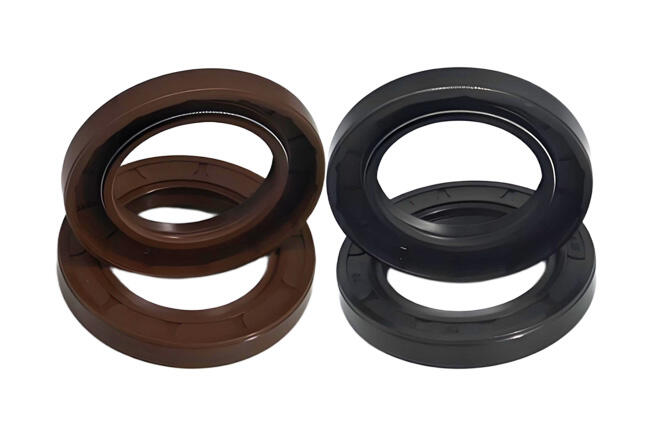בחירת הנכון חותם שמן TC עבור ציוד תעשייתי יכול לפעמים להרגיש כמו משימה טריוויאלית, אבל תאמין לי, אם אתה כבר בתעשייה מספיק זמן, אתה יודע שגם חוסר התאמה קל יכול להוביל זמן עצירה יקר ותאונות ציוד. העניין הוא, כי חותמות שמן TC משמשים באופן נרחב ביישומים רבים, אבל רק בגלל חלק יש את הממדים הנכונים לא אומר שזה מתאים לכל מכונה. זה לא תמיד עסקה של מידה אחת, ולמעשה, פרטים קטנים יכולים לעשות הבדל עצום.
כמי שעבד בשיתוף פעולה הדוק עם יצרנים, ספקים וצוותי תחזוקה לאורך השנים, אני יכול לומר לכם שבחירת חותם השמן הנכון אינה רק על קריאת הקטלוג. זה קשור להתאים את חותמת השמן לתנאי הפעלה בפועל של המכונה. הרשו לי להדריך אתכם בכמה שיקולים מרכזיים שיכולים לעזור לכם להימנע ממלכודות נפוצות בעת בחירת חותמות שמן TC למכשירים שלכם.
1. עניין החומר: אל תבחרו פשוט באפשרות היקרה ביותר
יתכן שתחשבו שבחירת חומר בדרגה הגבוהה ביותר למסננת השמן TC היא הבחירה הטובה ביותר, אך זה לא תמיד כך. החומר שבוחרים למסננת השמן חייב להתאים ליישום, לתנאי העבודה ולסוג הנוזל או שמן שאותו יפגוש.
עבור מכונות סטנדרטיות הפועלות על שמן קונבנציונלי, מסננת שמן מסוג NBR ( caoutchouc ניטריל-בוטאדיאן) היא בדרך כלל בחירה טובה. היא מציעה התנגדות טובה לשמן ולשחיקה, תוך שהיא כדאית מבחינה כלכלית. עם זאת, אם אתם עובדים עם ציוד הפועל בטמפרטורות גבוהות יותר או המשתמש בשמנים סינתטיים, ייתכן שתרצו לקחת בחשבון מסננות מסוג FKM (פלואורוקרבון) או Viton® , המסוגלות לעמוד בטמפרטורות גבוהות בהרבה.
שימו לב, עם זאת, שלא בכל יישום יש צורך לעבור מיידית ל-FKM רק בגלל שהוא עמיד יותר לחום. לפעמים NBR יהיה מספיק, וביצוע בחירה של FKM עלול להוביל לעלות מיותרת ללא תועלת אמיתית.

2. משטח הציר: חשוב יותר مما שאתה חושב
ראיתי אינספור מצבים שבהם בעלי ציוד החליפו שוב ושוב את החתמות של תיבת הילוכים, אך התגלו שוב בעיות דליפה זהות. לאחר בדיקה קפדנית יותר, מתברר לעתים קרובות שהבעיה לא הייתה בחותמות השמן בעצמן – אלא במשטח הציר.
אם משטח הציר אינו במצב טוב, אף חותמת שמן לא תפעל כראוי, גם אם מדובר באיכות הטובה ביותר בשוק. בעיות כגון:
خشונת משטח: משטח ציר מחוספס יכול להאיץ את ההתבלה של שפתי החותמת, מה שיגרום לדליפה מוקדמת.
חריצים וגרטים: יכולים להיווצר עקב טיפול לא נכון או בגלל שהציר נוגע בחלקיקים מחזירים.
קמור לא נכון: אם קצות הציר אינם מעוגלים כראוי, הם עלולים לפגוע בחותמת במהלך ההתקנה.
חשוב באותה מידה כמו בחירת החותמת הנכונה לוודא שהציר חלק, נקי ולא מכיל פגמים במשטח.
3. איכות ההתקנה: אל תדלגו על הפרטים
תהליך ההתקנה קריטי לחיים הארוכים וליעילותם של החותמים שמן TC. ניתן היה להימנע מבעיות תחזוקה רבות אם היו עוקבים אחר הליכי התקנה מתאימים. ראיתי מקרים רבים שבהם חותם השמן היה תקין, אך התקנה לא נכונה גרמה לכישלון.
ודאו כי:
פני המישור להתקנה נקיים ולא מכילים זבל.
השתמשו בכלים מתאימים להתקנה – אין להקיש על החותם כדי להכניסו, שכן זה עלול לגרום לעיוות.
קצהי הציר מעובדים בקמור נכון למניעת נזק לחותם במהלך ההתקנה.
עקרונות התקנה אלו עשויים להיראות כפרטים קטנים, אך הם יכולים ליצור הבדל עצום בהבטחת פעולת חותם השמן כראוי.
4. מהירות וטמפרטורה: גורמים שלא ניתן להתעלם מהם
כאשר בוחרים חותם שמן TC, קל להתעלם מהמהירות והטמפרטורה שבהן פועל המכשיר. גורמים אלו משפיעים בצורה משמעותית על ביצועי חותם השמן, במיוחד כאשר מדובר במהירויות גבוהות או טמפרטורות גבוהות.
במכונות במהירויות גבוהות, חיכוך מהציר יכול ליצור חום נוסף, שבעורו משפיע על ביצועי החֹתם. רבים שוכחים שחוזמי שמן חייבים לעמוד לא רק בפני הטמפרטורה החיצונית – אלא גם להתמודד עם החום שנוצר מחיכוך בין הציר לחֹתם.
אם אתם מתמודדים עם יישומים במהירות גבוהה, שקולו להשתמש בחוזמי שמן מסוג TC מוגברים המציעים עמידות טובה יותר בפני חום ותכונות חיזום טובות יותר תחת לחץ.
5. תנאי סביבה: אל תשכחו מאבק ומחום
גורם נוסף שנשכח לעתים קרובות בבחירת חוזמי שמן מסוג TC הוא התנאים הסביבתיים שבהם פועל המכשיר. למשל, אם המכונה שלכם פועלת בסביבה אפורה, או אם היא חשופה לחות, חוזמי שמן סטנדרטיים מסוג TC אולי לא יהיו מספיקים כדי למנוע דליפה.
עבור סוגים אלו של תנאים, ייתכן שתצטרכו לבחור חוזמי שמן מסוג TCV (הגנה מפני אבק) או TCK (שימוש כבד) שיש להם הגנה נוספת למניעת חדירת זיהומים.
6. יציבות שרשרת האספקה: עניין גדול עבור לקוחות
למפיצים וספקי חומרה, בחירת ספק אטמים אמין יכול להוות הבדל מהותי. זה לא רק עניין של איכות המוצר – אלא גם של שורת אספקה אמינה.
ב-NQKSF אנו מתגאים בהיצע מוצרים מקיף, עם משלוח מהיר של מלאי מעל ל-10,000 דגמים, החל מאום-רינג סטנדרטיים ועד אטמי TC. היכולת שלנו לעמוד בביקושים דחופים ולשמור על זמינות מתמדת של מוצרים עזרה לרבות עסקים לשמור על פעילות חלקה.
7. התאמה אישית: למה זה שווה את ההשקעה
בעוד פסי שמן סטנדרטיים ל-TC מצוינים לapplications רבות, יש מקרים שבהם הציוד עליו אתם עובדים הוא ייחודי, ודרוש פתרון מותאם. יותר ויותר יצרנים וספקים פונים לפסי שמן מותאמים אישית כדי לעמוד בדרישות מאוד ספציפיות.
ב-NQKSF אנו מציעים שירות התאמה מלא – מבחירת החומרים, דרך עיצוב המבנה ועד לבדיקות ייצור. שירות זה מבטיח שהתוויות מתאימות בדיוק לתנאי הפעלה שלך, מקטינות את עלות התפעול ומחזקות את אורך חיי הציוד.
8. בחרות במותג הנכון
בחירת תייל שמן אינה רק עניין של עלות מיידית. יש גם לקחת בחשבון את ניסיון המותג והמוניטין שלו בתחום התעשייה. המותג הנכון לא רק יציע מוצרים איכותיים, אלא גם יספק תמיכה טכנית מקיפה, משלוח מהיר ושירותי אחרי המכירה.
עם NQKSF אתה מקבל גישה ליצרן מוסד עם יותר מ-30 שנות ניסיון בתחום החיזוקים. אנחנו מובילים בתחום, עם טווח רחב של מוצרים, ובנינו אמון אצל לקוחות ביותר מ-80 מדינות. בין אם מדובר בתוויות סטנדרטיות או בפתרונות מותאמים אישית, המוצרים שלנו עוזרים לשפר את אמינות הציוד שלך ולצמצם periods של הדחק בתפעול.
בחירת החתימה הנכונה של TC לדלק למכונות שלך הולכת הרבה מעבר לבחירה פשוטה של חלק מקטלוג. מדובר בהבנת תנאי הפעלה של המכונה, שיקול של חומר, משטח ציר, שיטת התקנה, מהירות, טמפרטורה וגורמים סביבתיים, ודאגה להזמנת פריטים מספק אמין ובעל ניסיון.
לדוכנים, יצרני ציוד מקוריים וצוותי תחזוקה, עבודה עם מותג מהימן כמו NQKSF מבטיחה שתוכלו לשמור על ריצת המכונות שלכם בצורה חלקה, וכן לספק גמישות ותמיכה כדי לעמוד בצרכים ספציפיים בתחום החיתוך.
 חדשות חמות
חדשות חמות